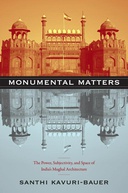Explore
Monumental Matters : The Power, Subjectivity, and Space of India’s Mughal Architecture
Santhi Kavuri-Bauer
2011
0 Ungluers have
Faved this Work
Login to Fave
Built in the sixteenth and seventeenth centuries, India’s Mughal monuments—including majestic forts, mosques, palaces, and tombs, such as the Taj Mahal—are world renowned for their grandeur and association with the Mughals, the powerful Islamic empire that once ruled most of the subcontinent. In Monumental Matters, Santhi Kavuri-Bauer focuses on the prominent role of Mughal architecture in the construction and contestation of the Indian national landscape. She examines the representation and eventual preservation of the monuments, from their disrepair in the colonial past to their present status as protected heritage sites. Drawing on theories of power, subjectivity, and space, Kavuri-Bauer’s interdisciplinary analysis encompasses Urdu poetry, British landscape painting, imperial archaeological surveys, Indian Muslim identity, and British tourism, as well as postcolonial nation building, World Heritage designations, and conservation mandates.
This book is included in DOAB.
Why read this book? Have your say.
You must be logged in to comment.
Rights Information
Are you the author or publisher of this work? If so, you can claim it as yours by registering as an Unglue.it rights holder.Downloads
This work has been downloaded 395 times via unglue.it ebook links.
- 120 - pdf (CC BY-NC-ND) at OAPEN Library.
- 153 - pdf () at Unglue.it.
- 89 - pdf (CC BY-NC-ND) at OAPEN Library.
Keywords
- Delhi
- Hinduism
- History
- History / Asia / India & South Asia
- India
- Islamic Architecture
- KUnlatched
- Mogul Architecture
- Monuments
- Mosque
- Mughal Empire
- Muslims
- Red Fort
- Taj Mahal
Links
DOI: 10.1215/9780822393764Editions


